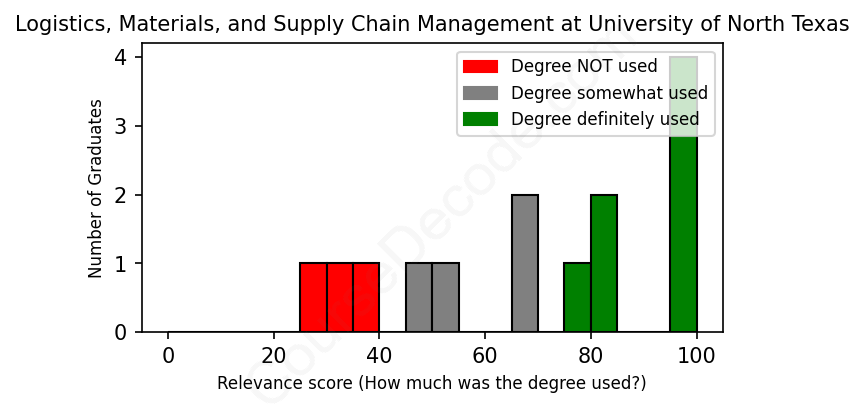
First, some facts. Of the Logistics, Materials, and Supply Chain Management graduates from University of North Texas we've analyzed , here's how many have used (or NOT used) their degree in their career:

These are estimates based on AI analysis of 14 LinkedIn profiles (see below).
The verdict? Slightly above average. Overall, with an average relevance score of 69%, Logistics, Materials, and Supply Chain Management graduates from University of North Texas have a slightly higher likelihood (+2%) of finding work in this field compared to the average graduate across all fields:
And for comparison, here's the chart for all profiles we've looked at across all degrees.
Also, after graduating, only 7% of these graduates have pursued further education other than another Bachelor's degree (such as a Masters degree or other), compared to the average across all profiles of 35%. This suggests a Bachelors degree is enough for most Logistics, Materials, and Supply Chain Management graduates, and it's normal to look for work straight after graduation.
See the details:
|
Relevance score: 29% We think this person has NOT gone into a career related to their degree. We think this person has NOT gone into a career related to their degree.
DEGREE INFOGraduated in 2016 from University of North Texas with a Bachelor's degree in Logistics, Materials, and Supply Chain Management. Also pursued further education since (see below). JOB HISTORY SINCE GRADUATIONIntern Alliance Operating Services Jan 2016 - Jun 2017 Accounts Reconciliation  Mercedes-Benz Financial Services USA LLC Jul 2017 - Jul 2018 FURTHER DEGREES DONE SINCE GRADUATINGMaster's degreeUniversity of North Texas 2017 - 2019 ABOUTNo information provided. |
The top 10 most common jobs done by the graduates we've analyzed (ranked most common to least) are:
The job landscape for graduates of Logistics, Materials, and Supply Chain Management from the University of North Texas reveals a mix of roles, with many individuals finding positions directly tied to their degree. Common roles include Operations Managers, Supply Chain Analysts, and Logistics Specialists, with a significant number of graduates working in warehouse management or as area managers in companies like United States Cold Storage and Hitachi. These positions are highly relevant, as they require a strong understanding of logistics principles, inventory control, and supply chain optimization—skills that are foundational to their academic training.
However, not all graduates have landed jobs that align closely with their studies. Some have taken on roles in unrelated fields, such as education and sales, or positions where logistics knowledge is just a small part of the job, like account management. For instance, roles like Assistant Language Teacher and Inside Account Manager II might not fully leverage their logistics training. But overall, a significant number of graduates are indeed applying their skills in relevant positions, showcasing the degree's effectiveness in equipping them for success in the ever-evolving field of logistics and supply chain management.
Here is a visual representation of the most common words in job titles for Logistics, Materials, and Supply Chain Management graduates (this is across all Logistics, Materials, and Supply Chain Management graduates we've analyzed, not just those who went to University of North Texas):

Graduates from the University of North Texas who have pursued degrees in Logistics, Materials, and Supply Chain Management seem to have generally positive career trajectories. Right after graduation, many of them are landing roles like operations managers, analysts, and coordinators at well-known companies, indicating that they are able to secure jobs directly related to their field of study. It’s also common for these grads to move up within a few years; for example, those starting as analysts often transition into more senior roles like senior advisors or managers within a few years, which suggests a supportive growth environment in the industry.
Looking at the long-term, say five to ten years later, a lot of these professionals continue to climb the career ladder, often landing positions like supply chain managers or logistics directors at significant organizations like Dell, Microsoft, or Walmart. Most of the individuals in the profiles analyzed have remained in logistics or a closely related field, showing a strong demand for professionals with this background. Of course, there are some variations with a few moving into different industries, but overall, it's clear that a degree from UNT in this area tends to lead to relevant and successful careers. So, if you’re considering this path, it seems like a solid choice!
Honestly, a Bachelor’s degree in Logistics, Materials, and Supply Chain Management at the University of North Texas is pretty manageable, especially if you're organized and enjoy problem-solving. It's not as intense as some other business majors, but it does require you to understand concepts like inventory management and operations analysis. You’ll get a mix of theory and practical knowledge, and most students find it interesting because it involves real-world applications. If you're into planning and figuring out how things work behind the scenes, you'll likely find it a fun challenge with a good mix of group projects and hands-on assignments. Overall, it tends to be a bit easier than, say, a finance or engineering degree, so you'll probably do just fine if you keep up with your studies!
Most commonly, in the LinkedIn profiles we've looked at, it takes people 4 years to finish a Bachelor degree in Logistics, Materials, and Supply Chain Management.
Looking at the career paths of these Logistics, Materials, and Supply Chain Management grads from the University of North Texas, it seems like most of them have found pretty decent opportunities and potentially good salaries. Positions like Operations Manager, Senior Logistics Specialist, and even a role at Microsoft suggest that they've moved up the ladder fairly quickly, which usually comes with a nice payday. While we can't see exact numbers, roles in established companies like Dell and Walmart typically offer competitive salaries, so it’s fair to say these folks are likely doing alright financially, especially considering the range of managerial positions they’ve landed in just a few years. Overall, it looks like they're on a solid track in their careers!
Here is a visual representation of the most common words seen in the "about" section of LinkedIn profiles who have a Bachelor degree in Logistics, Materials, and Supply Chain Management (this is across all Logistics, Materials, and Supply Chain Management graduates we've analyzed, not just those who went to University of North Texas). This may or may not be useful:

Here are all colleges offering a Bachelor degree in Logistics, Materials, and Supply Chain Management (ordered by the average relevance score of their Logistics, Materials, and Supply Chain Management graduates, best to worst) where we have analyzed at least 10 of their graduates:
| College | Score | Count |
|---|---|---|
 Michigan State University Michigan State University
|
84 | 23 |
 Auburn University Auburn University
|
83 | 19 |
 Ashford University Ashford University
|
82 | 12 |
 University of Wisconsin-Milwaukee University of Wisconsin-Milwaukee
|
81 | 10 |
 Rutgers Business School Rutgers Business School
|
79 | 24 |
 Penn State University Penn State University
|
78 | 21 |
 Embry-Riddle Aeronautical University Embry-Riddle Aeronautical University
|
78 | 10 |
 Arizona State University - W. P. Carey School of Business Arizona State University - W. P. Carey School of Business
|
78 | 14 |
 Iowa State University Iowa State University
|
77 | 14 |
 University of Houston University of Houston
|
76 | 30 |
 University of Arkansas University of Arkansas
|
76 | 18 |
 University of Tennessee, Knoxville University of Tennessee, Knoxville
|
75 | 15 |
 University of North Texas University of North Texas
|
69 | 14 |
 Texas A&M University Texas A&M University
|
67 | 27 |
 Georgia Southern University Georgia Southern University
|
62 | 13 |
 The Ohio State University The Ohio State University
|
60 | 10 |
 University of Houston-Downtown University of Houston-Downtown
|
57 | 13 |